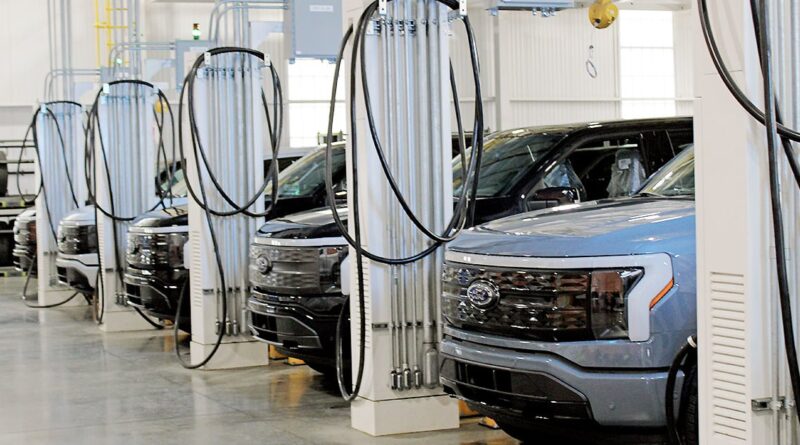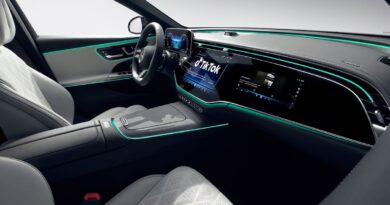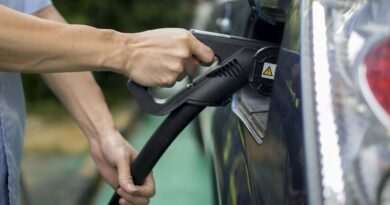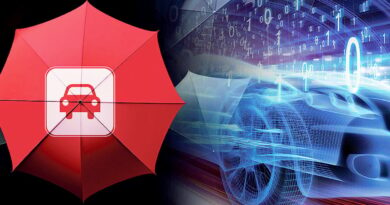National Charging Experience Consortium includes automakers, charging firms, researchers
The U.S. Joint Office of Energy and Transportation will bring together automakers, electric vehicle charging companies, researchers and other stakeholders to create solutions to improve the EV charging experience.
The National Charging Experience Consortium, led by Department of Energy national laboratories, will develop best practices and work to solve charging pain points over the next two years. Participating research labs will publish the consortium’s findings and make recommendations.
The group has 29 members and counting. Automakers General Motors, Ford Motor Co., Stellantis, BMW North America, Tesla and Rivian Automotive; charging networks; charger manufacturers; consulting firms; and electric utilities have joined so far.
Charger reliability is a major pain point as the Biden administration aims to have a nationwide network of 500,000 public charging stations by the end of the decade. One in five charging attempts in the U.S. failed last year, according to J.D. Power.
Lawmakers want to ensure that chargers are reliable; the consortium will identify deficiencies in today’s network and develop proposals to ensure a better charging experience, John Smart, director of the consortium and group lead, mobility analytics at Idaho National Laboratory, told Automotive News.
The group will meet monthly starting June 1. The consortium has set a goal for public charging stations nationwide to provide a charge to vehicles on the first attempt. The national labs will also include data from EV drivers in its analysis.
The consortium has three primary objectives to meet its goal:
- Define and track the charging experience with a set of key performance indicators.
- Identify the top issues that prevent charger reliability and usability, such as communication failures and user interface inconsistencies.
- Develop solutions for scaling chargers and ensuring reliability by improving testing methods and sharing diagnostics across companies.
Payment and user interface and communication between the charger and the vehicle are among the most frequent charging issues, Smart said.
User interface and accepted payment methods vary across charging stations. The charger also has to connect with the vehicle. The industry has standards for the handshake between the charger and the vehicle. The consortium will identify shortcomings and propose ideas for improvement.
“The status quo today is for every vehicle to be tested with every charger,” Smart said. “While that has been accomplished successfully so far, we don’t see that as scalable for the future as more and more EVs and chargers come to market.”
The national labs will work with industry participants to streamline testing before chargers are deployed and to develop remote testing methods.
The consortium ties into a $51 million Ride and Drive Electric funding opportunity, announced this month, within the Biden administration’s infrastructure law. The Ride and Drive Electric funding aims to enhance EV charging resilience, provide equitable access to charging, and improve charger performance and reliability.
The National Charging Experience Consortium has more industry involvement than other government-led consortia, Smart said.
The industry has struggled with charging consistency and reliability for a number of reasons, including lack of data sharing as automakers and charging companies are reluctant to share data with competitors. The national labs will keep members’ data confidential and provide an independent review of data from all participants, Smart said.
Industry participation is critical to scaling and validating EV charging infrastructure, Smart said.
“Our goal is to produce solutions that industry buys into and can immediately implement to overcome barriers to charge infrastructure, reliability and usability,” Smart said.
Ford and GM each said that collaboration is key to deploying a reliable charging network.
“Bringing together a cross-section of industry, academia and government will address current challenges and drive swift improvements to the entire charging experience, helping Ford customers and all EV drivers realize all the benefits of driving electric,” Bill Crider, Ford’s head of global charging and energy services, said in a statement.
Boosting consumers’ charging confidence with a reliable network will also be crucial for broad EV adoption, Electrify America and EVgo, two of the largest charging networks, said in statements to Automotive News.
“This effort requires everyone in the charging ecosystem—automakers, policymakers, charging manufacturers and [electric vehicle service providers] like EVgo — to collaborate on solutions,” an EVgo spokesperson said.
Source : Autonews.com




